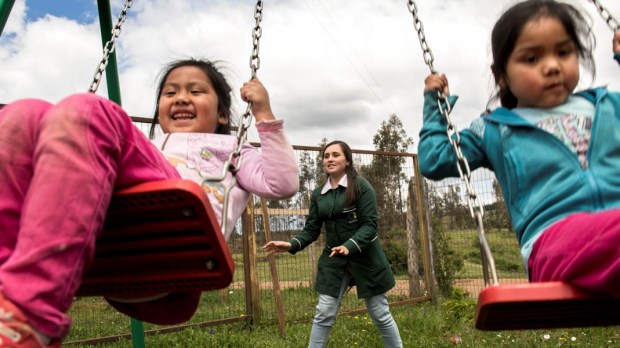Pope Francis will land in Santiago, Chile, on January 15 for a three-day visit during which he wants to thank God for the faith Chileans have put into action over the years through their work for social justice. He made the comments about his trip in a video message to the people of Chile and Peru released January 9.
While the pope’s goals for the trip are simple — he wants to share “the Lord’s peace” and “experience God’s closeness among you” — the reality he will find in Chile is anything but simple.
Pope Francis has chosen to visit three specific Chilean cities: Santiago, Temuco and Iquique. Each city is dealing with different issues that make up the heart of the pope’s message to Catholics and all people of goodwill.
Valeria Lopez, a lay spokesperson for the Church who is a canon lawyer for the Interdiocesan Tribunal of Santiago (a Church court based in Santiago), says the pope’s visit to those three places will put the issues of poverty, migration, and indigenous rights — as well as the Church response to sexual abuse — front and center and, hopefully, start a national conversation.
Indigenous rights
Temuco, a city 416 miles south of Santiago, is the epicenter of the struggle between the government and the indigenous Mapuche population.
The Mapuche people kept Spanish conquerors off their land for 300 years. In the 1860s the Chilean government decided to claim the Araucania region — where Temuco lies — in order to solidify its hold over the newly independent nation. Between 1867 and 1869 state troops “pacificied” the region, fighting the Mapuche and occupying their land.
Since then the Mapuche of Chile have lost their lands to timber companies and large ranches owned by Europeans. This has resulted in poverty among the Mapuche, and led them to organize in order to push for reparation and restitution of their ancestral lands.
There has been violent conflict in Araucania — in 2017 over a dozen churches, both Catholic and Protestant, were burned by Mapuche activists. One group has scheduled a press conference during the papal trip to ask Pope Francis to apologize for the Church’s role accompanying the Spanish colonizers and the Chilean occupiers.
According to Lopez, however, this represents the view of a minority of the Mapuche people.
It is estimated that 50percent of Chile’s Mapuche population is Catholic and the Church has been engaged in efforts to ensure their rights are upheld by the government. Bishop Hector Vargas of Temuco sat on two government commissions that brought government and Mapuche representatives together to work out a deal on how Mapuche communities would be governed.
It is expected that Pope Francis will address the issue of indigenous rights during this portion of the trip. During his July 2015 trip to neighboring Bolivia the pope addressed the Second World Meeting of Popular Movements and tackled the issue of abuse of indigenous people and apologized for the Church’s role in those abuses.
Migration
In Iquique the migration issues will be in the spotlight. The city itself lies on the Pacific coast in the north of Chile, not far from Peru.
Bishop Guillermo Vera Soto told the Chilean news site Economia y Negocios there has been a large Peruvian population in Iquique for at least 30 years, but in recent years Haitian and Cuban immigrants have arrived in large numbers on a daily basis.
Church-run welcome centres in Iquique help migrants find housing, get legal status in the country, and find work to support themselves. But the number of immigrants arriving in Iquique is not insignificant. Bishop Vera said, “Neither the church or the government can do enough,” to meet the needs of new arrivals.
The relationship between the Church and the people will be a key issue throughout the pope’s visit.
Although a majority of Chileans identify as Catholic, that number has fallen significantly in recent year from 67 percent of Chileans identifying as Catholic in 2012 to 58 percent.
Lopez said the decline is a byproduct of the country’s rapid economic development and increased influence from markets in the Northern Hemisphere. In this new climate, he says, there are essentially two “Chiles”: one in which people care more about themselves and their things than their next door neighbour, and another in which people are acutely aware of and engaged in work to combat the unequal distribution of wealth in the country.
Another factor is the clerical sexual abuse scandal that was uncovered in 2010.
Father Fernando Karadima, a well loved priest with a charismatic personality, had abused at least three young men as far back as the 1980s. It is claimed that credible reports made by his victims were reportedly ignored or quieted by members of the Church hierarchy, including Cardinal Francisco Errázuriz Ossa.
Pope Francis’ decisions in 2015 to make Cardinal Errázuriz Ossa part of his advisory committee and to make Errazuriz’ successor a cardinal were poorly received by many in Chile.
Pope Francis is likely to address the painful scars of sexual abuse when he meets privately with Chilean bishops on the evening of January 16. There are unconfirmed reports that he may also meet with sexual abuse survivors during this portion of the trip. Pope Benedict XVI met with abuse survivors on numerous trips.
Pope Francis will be in Chile from January 15 to 18. From Iquique, Chile, he flies to Lima, Peru. The pope will be in Peru from January 18 to 21.
As he has done on his trips inside and outside of Italy, Pope Francis will be calling on people to open their hearts and doors to migrants, to put aside any fear of “others,” and to share the richness of each other’s cultural traditions. Along with this, he will probably drive home the fact that today’s migrants are escaping countries where life has become next to impossible for a variety of reasons — natural disasters, climate change, oppressive governments, and oppressive poverty.

